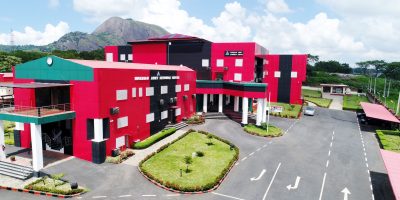Nigerian Army Resource Centre (NARC) Weekly Subject Experts’ Presentation was held at Hall C, TY Buratai Block, Abuja. There were three presentations made by the Subject Experts on China, South America and the Carribean, Middle East, North Africa and Turkey.
The first presentation by Maj Gen JA Orokpo (Rtd) subject experts on China, he discussed how A Woman kills her three Year old Son in South West China. The Global Times reported on 1 Apr 24 that a 3-year-old boy was killed after being thrown off a 22nd floor apartment by his maniac mother in South West China’s Chongqing municipality. According to the Police statement, the 37 year-old suspect, surnamed He, suffered from sudden mania at home around 7 am. She injured her mother in-law with a kitchen knife and then killed her son by throwing him out of their apartment window.
[[[
In his analysis and lessons for Nigeria, Maj Gen JA Orokpo (Rtd) noted that, In the past few years, there have been several tragic incidents of individuals jumping into the Lagos Lagoon. On 10 Mar 24, a woman, Nimotalahi Ishola jumped into the Lagoon while on board a ferry at Igando, Lagos State. The incident occurred around 9 pm, shortly after the boat left the jetty. In another case, a Lagos socialite, Mrs Salome, parked her SUV on the Third Mainland Bridge and attempted suicide, but for the swift intervention of passers-by, who prevented the tragedy. In recent times, there has been a rise in cases of murder and suicide linked to depression and mental illness in Nigeria. The most common causes of depression include poverty and economic hardship.
He recommended that, the FGN could prioritise poverty alleviation programmes aimed at lifting citizens out of extreme poverty and should invest in mental health services and awareness including training of healthcare professionals and also Establish Community Support Networks to provide social and emotional support to individuals and families affected.
Equally the second presentation Brig Gen SA Gumel Subject experts on South America and the Carribean, focused his presentation on Dominican Republic Increases Border Security with New Border Wall amid Haitis Crisis. He said Border security has become a major concern for the Dominican Republic as gang violence flung the neighboring nation of Haiti into chaos, prompting tighter border security and deportations. An estimated 5 million people in Haiti are in need of humanitarian aid and some 362,000 Haitians have been internally displaced across the country. In Port-au-Prince, Haiti’s Capital, where over 160,000 people have been displaced, extreme violence remains high and gangs are believed to control 80% of the city. Despite the increasingly dire situation, and relatively short distance of Haiti’s capital to the border with the Dominican Republic, Haitian refugees have not been permitted to enter the only other nation on the shared island of Hispaniola.
In his analysis and lessons for Nigeria, Brig Gen SA Gumel stressed that, Nigeria’s verdict to upscale its border security measures holds profound implications for national security, economic stability, regional cooperation, and human rights. By strengthen border controls, Nigeria aims to enhance sovereignty, curtail illicit activities, and promote stability within its territory and the broader region. However, the effectiveness of these measures must be balanced with respect for human rights, diplomatic considerations, and regional cooperation efforts. Consequently, as Nigeria navigates the complexities of border security, it must remain resolute in safeguarding national interests while upholding democratic principles and respecting the rights of all individuals, both within its borders and beyond.
He recommended that, the Federal Government of Nigeria should ensure that border security measures are implemented in accordance with international human rights standards, respecting the rights and dignity of migrants and refugees, and providing access to legal avenues for asylum seekers and those in need of protection and to also strengthen cooperation with neighboring countries to address shared security challenges collaboratively, including information sharing, joint patrols, and capacity-building initiatives to promote stability and combat cross-border threats.
While the third presentation by Brig Gen SO Oloyede Subject experts on Middle East, North Africa and Turkey centered his presentation on how Iran Attacks Israel With Over 300 Drones and Missiles. On 1 April 2024, Israel attacked an Iranian diplomatic compound in the Syrian capital of Damascus, killing seven members of Iran’s Islamic Revolutionary Guard Corps, including two senior commanders (Washington Post, 2024)
his analysis and lessons for Nigeria, Brig Gen SO Oloyede pointed out that, Despite UN Resolution 2728 on Ceasefire in Gaza, it is obvious from the threats and actions by the allies of Israel and Palestine that they are not interested in Middle East peace. As the Israeli-Hamas conflict in Gaza escalates, Petsangouraki (2024) opines that a major factor that no one seems to be discussing is the importance of natural gas that lies off the shores of Israel – or its Exclusive Economic Zone (EEZ) – in this whole conflict. Petsangouraki (2024) noted that before the recognition of Palestine in an observer status as a member of the UN, Israel had previously approved the development of Gaza Marine, the strip of water off the Gaza coast containing an estimated 1tn cubic feet of natural gas. Consequently, the natural resources from Gaza EEZ is vital to the belligerents and their allies’ economic interest and national security. This is protected through a strong alliance, Nigeria’s needs to protect her economic interests in the West African sub-region through ECOWAS where Nigeria makes the highest financial and military contributions, and other bi-lateral or multi-lateral agreements. Nigeria could learn a lesson from Israel’s information dissemination approach on the need to know basis in order to prevent likely sabotage.
He recommended that, the Federal Government of Nigeria should engage in bi-lateral cooperation with credible alliances for the necessary technology required for nuclear capability in Nigeria and also improve on its military industrial complex, through a complete overhaul and massive private sector investment in the Defence Industries Corporation of Nigeria.






























